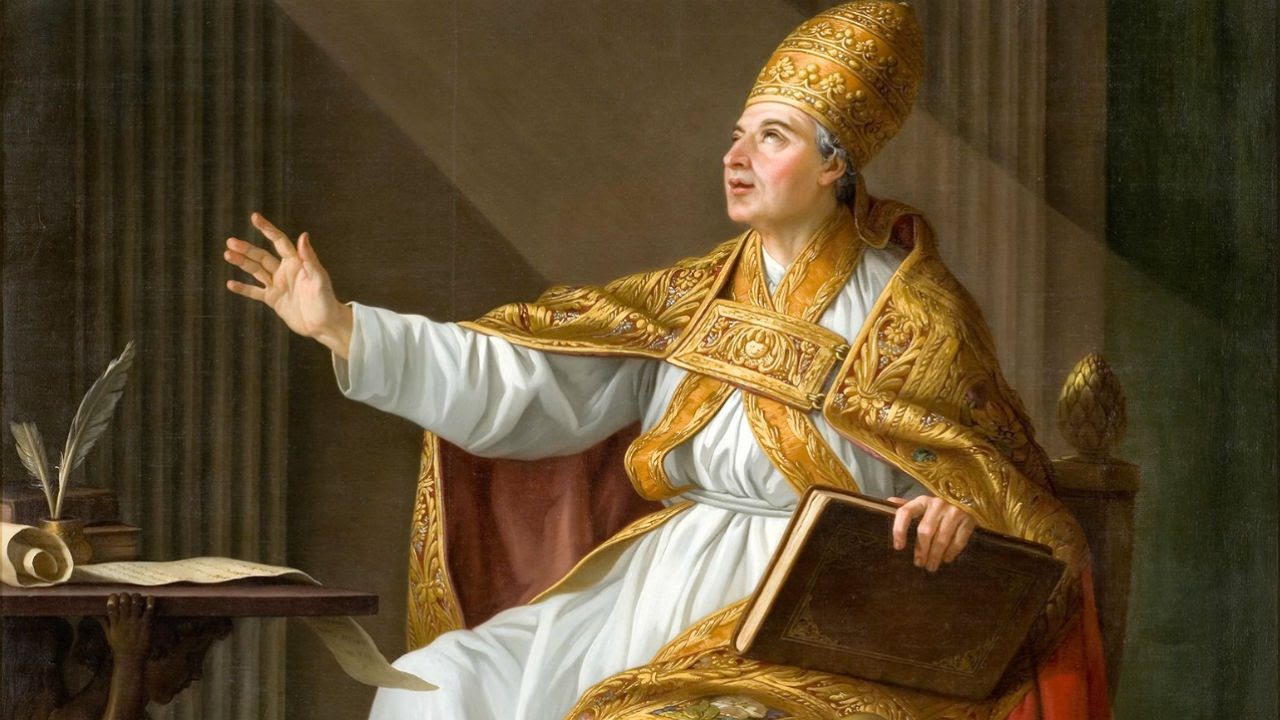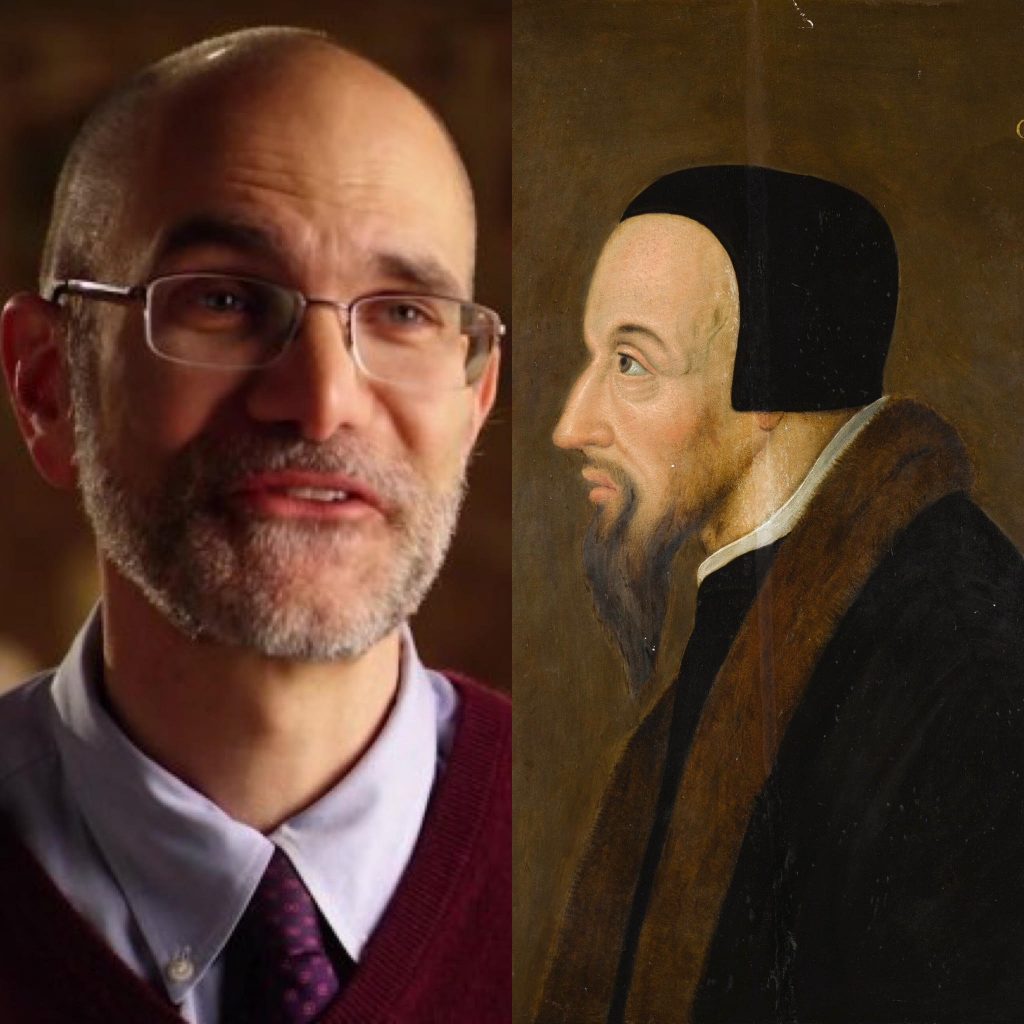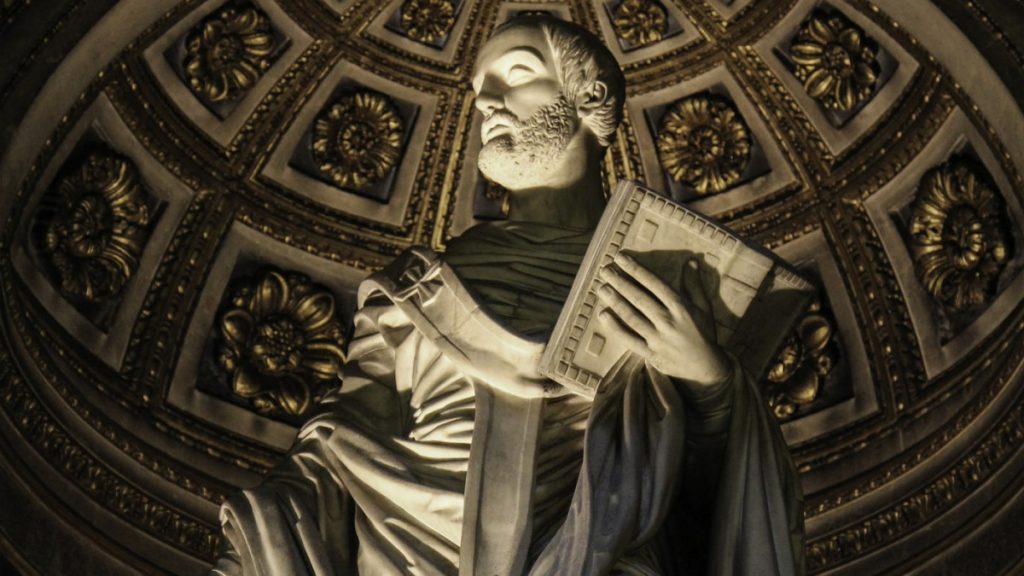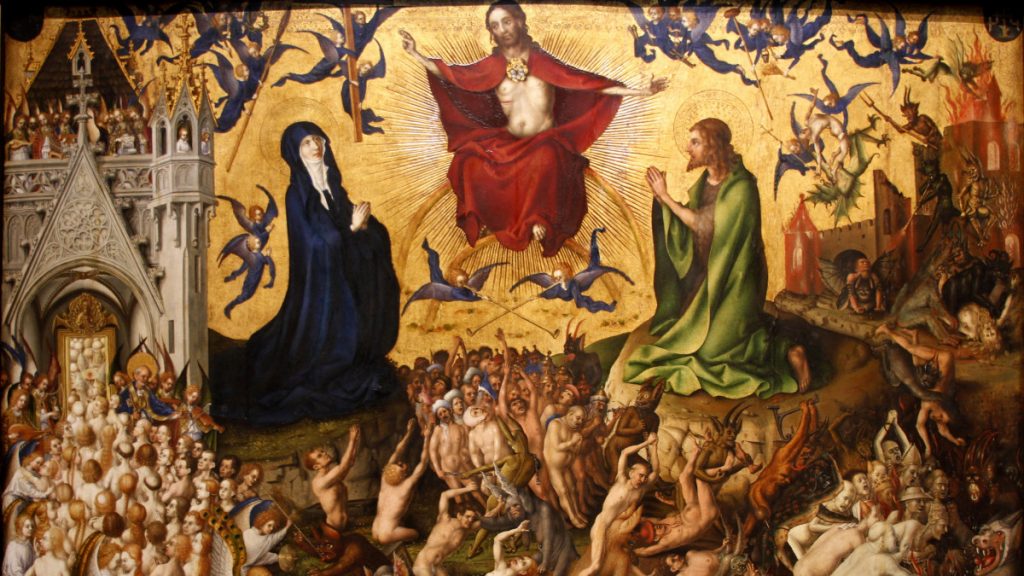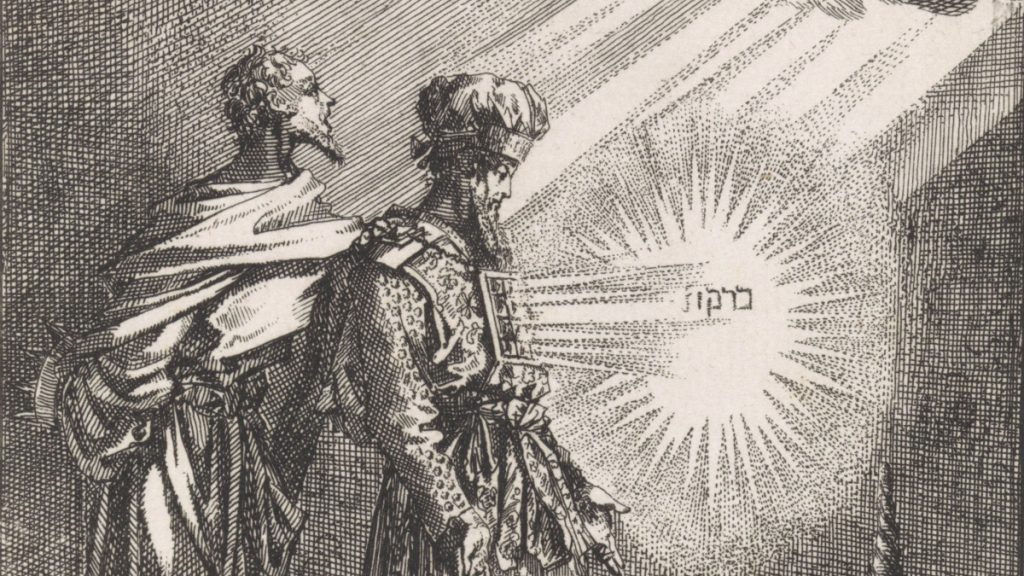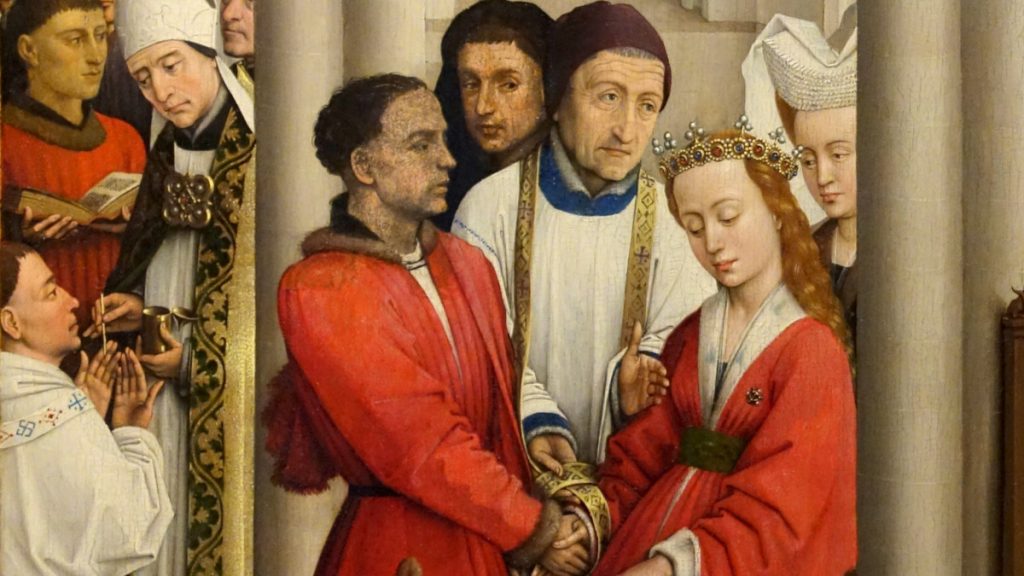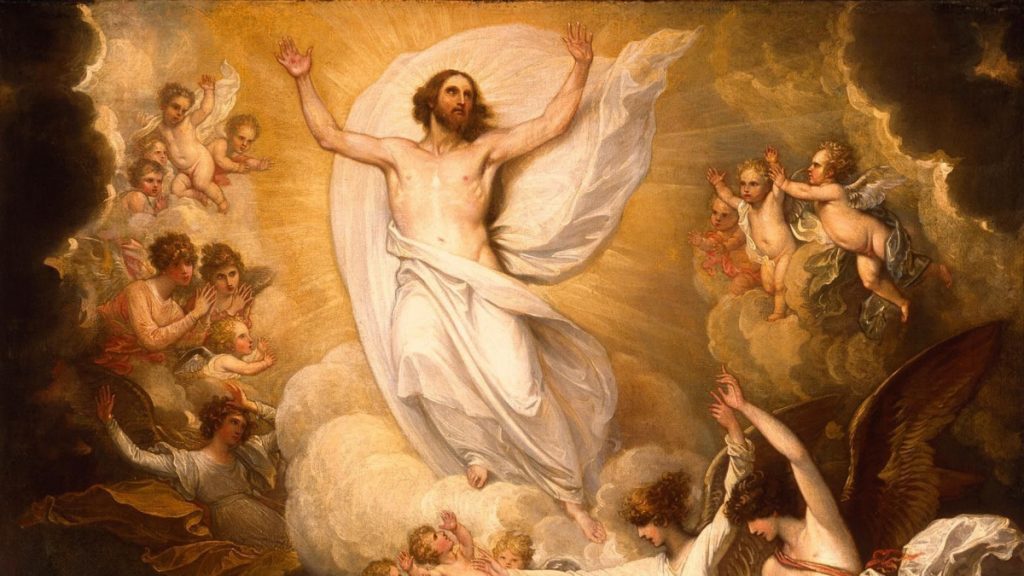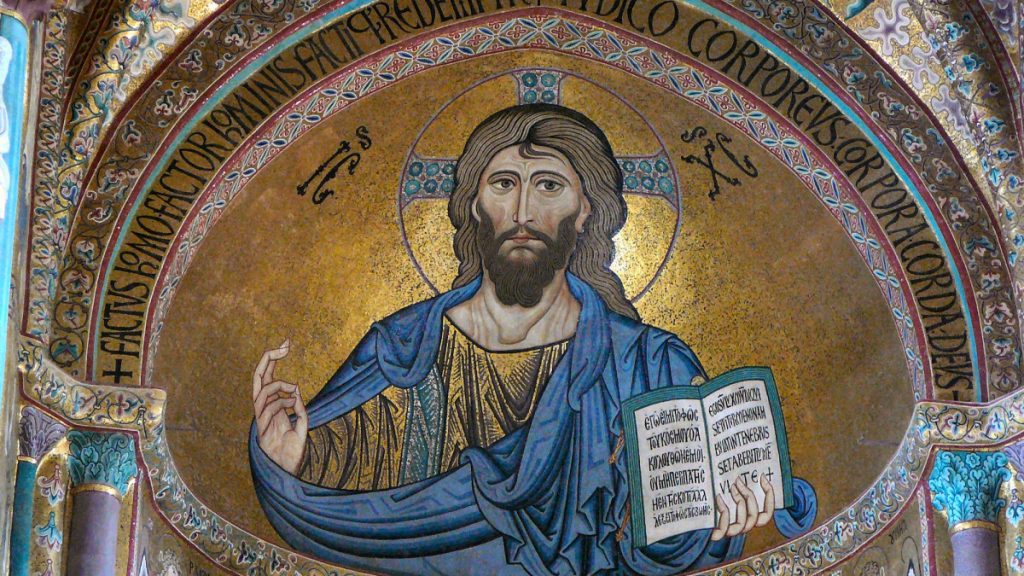(Updated July 17, 2025)
This Author Quote Archive collects pertinent quotes from the Church Father, St. Pope Gregory the Great.
Next to each quote are the Topic Quote Archives in which they are included.
This Quote Archive is being continuously updated as research continues. Quotes marked with “***” have not yet been organized into their respective Topic Quote Archives.
Books
St. Pope Gregory the Great, Moralia on Job (c. 578-95)
- Development of Doctrine | Book 27, Ch. 8, §14
(Book 27, Ch. 8, §14)1
The stars of rain can also be understood as the holy apostles, about whom Jeremiah says to rejected Judea as follows: “The stars and the rain have been withheld, and the later rain has not fallen” (Jer. 3:3). The Lord then removed the stars for the rain and poured down rain to double a flood, because when he took the preaching apostles away from Judea, he irrigated the world with the teaching of new grace. That both of these acts happened in the church can be advantageously understood in that when the apostles’ bodies were done away with and their souls were removed to the secret bosom of heaven, it was as though God hid the stars of rain from the face of the sky. But when the stars of rain were 254 | 255 taken away, God sent rain like a flood, because with even the apostles removed to heaven, the flood of divine knowledge that long lay hidden was revealed with more abundant outpouring through the opened tongues of the followers of the apostles.
What the apostles, you see, spoke briefly, their followers in their expositions expanded and multiplied. So it is not without reason that the very preaching and exposition should be compared to a flood, because since they collect the words of their many predecessors, they themselves grow more profoundly by means of the words that they pass on. At the same time as they join testimony to testimony, it is as though they collected drops of water to make a flood. The Gentiles are daily taught with these words, and because the minds of sinners receive knowledge of heaven, it is as though the standing water on the ground exhibited floods. But these expositors never exhibit themselves as superior to the apostles in knowledge when they speak at length in their exposition. They ought, you see, always to remember through whom they have received the discoveries of their knowledge.
St. Pope Gregory the Great, Book of Pastoral Rule (590)
Whence also the first pastor [St. Peter] anxiously admonishes, saying, “The elders which are among you I beseech, who am also an elder, and a witness of the sufferings of Christ, and also a partaker of the glory that shall be revealed, feed the flock of God which is among you” (1 Pet. 5:1)…
Hence Peter, when he saw some affrighted by consideration of their evil deeds, admonished them, saying, “Repent, and be baptized every one of you” (Acts 2:38). For, being about to speak of baptism, he spoke first of the lamentations of penitence; that they should first bathe themselves in the water of their own affliction, and afterwards wash themselves in the sacrament of baptism. With what conscience, then, can those who neglect to weep for their past misdeeds live secure of pardon, when the chief pastor of the Church himself believed that penitence must be added even to this Sacrament which chiefly extinguishes sins?
St. Pope Gregory the Great, Dialogues (c. 593)
- Purgatory | Book 4, §§41-42, 57 62
- Miracles in the Ancient Church | Book 3, §§21 -25 | Book 4, §§32, 42
MIRACLE: A Nun Expels a Demon from a Man into a Pig
(Book 3, §21)2
GREGORY: I am going to tell you a story for the truth of which the saintly old man Eleutherius, whom I mentioned above, will be my witness. There was a young woman in Spoleto filled with a strong desire to lead the religious life. She was of marriageable age, the daughter of a state official. In spite of her father’s attempts to stop her from entering this way of life, she took the religious habit. As a result she was disinherited, receiving as her sole share half of a small farm. Inspired by her example, many other young ladies of the upper class turned from a worldly life to serve almighty God with her in the holy state of virginity. One day, the saintly abbot Eleutherius came to instruct and encourage her. As they sat there speaking about the word of God, a tenant of the estate she had received as the portion of her inheritance came to her with a gift. Just as he presented himself to them, he fell to the ground and under the compulsion of an evil spirit began to writhe in pain and bleat noisily. The holy nun arose and with an angry look on her face exclaimed, “Leave this man, you wretch! Leave him, I say!” The Devil answered through the voice of the possessed man, “And if I leave him, into whom shall I enter?”
A small pig happened to be feeding nearby. So, when the 152 | 153 nun commanded him to enter into it, the evil spirit promptly left the man and entered the pig, killed it, and departed.
PETER: I would like to know whether she ought to have allowed even a pig to come under the control of the evil spirit.
GREGORY: The deeds of Christ, who is Truth itself, are the norms set up for our conduct. Was it not Him that the entire legion of devils in the possessed man directed their words? “If thou hast a mind to cast us out, they said, send us into the herd of swine” (Matt. 8:31). And Christ, after casting them out, allowed them to enter the swine and drive them over the precipice.
From this we know, too, that without God’s permission the evil spirit has no power against mankind, for he could not even have entered into the swine if God had not allowed it. We must therefore subject ourselves of our own free will to Him to whom all opposing forces must subject themselves even against their will. By doing so we become stronger than our enemies, for through our humility we become one with the Creator of the universe. Is it surprising, then, if God’s chosen followers, perform wonders during their lifetime? Even in death it is not uncommon for their bones to be alive with miraculous power.
MIRACLE: A Thief Prevented by the Relics of a Holy Priest from Stealing a Sheep
(Book 3, §22)3
GREGORY: The following incident, related to me by Abbot Valentio of happy memory, occurred in Valeria. A pious priest of that province was leading a monastic life with his clergy, 153 | 154 intent on good works and the praises of God. The day of death overtook him and he was buried in front of the church. It so happened that the way to the sheepfold, which was nearby, led through the place of his burial.
One night while the clergy was in church reciting the Office, a thief came to the sheepfold and left quickly with a stolen sheep on his shoulders. When he was about to pass the grave of the saintly priest, he was suddenly rooted to the ground, unable to move a foot. Taking the sheep down from his shoulders, he wanted to set it free, but was unable to do so; his hands would not let go of the sheep. So he stood there bewildered, caught with the booty, unable to get rid of it or to run off with it. He who had feared detection by the living was now, miraculously, held fast by the dead. Bound as he was hand and foot, he remained on the spot unable to move.
In the morning, after the praises of God were ended, the clergy came out of the church and found this stranger holding the sheep. At first sight it was hard to tell whether he was taking the sheep or making an offering of it. But the culprit could not hide his guilt very long. Amazed that through the merits of the saintly man of God the thief should stand before them unable to get rid of the booty, they began at once to pray and only through fervent prayer were they able to obtain his release. After standing there all this time forced to hold on to the stolen sheep, the thief could finally take his departure, once again free and unburdened.
PETER: The graciousness of almighty God toward us becomes apparent in these delightful miracles.
MIRACLE: A Holy Abbot’s Dead Body Moves Over to Allow Another Priest to be Buried With Him
(Book 3, §23)4
GREGORY: The monastery of St. Gregory, Peter, that home of saintly men, stands on a mountain overlooking the city of Palestrina. It is from there I got the next story I am going to tell. I was still living in my monastery when I first heard it and was assured by the monks that they had accurate knowledge of the facts.
By carefully supervising the spiritual development of one of his monks, a holy abbot of St. Peter’s had led him to a high degree of sanctity. Seeing that he had made remarkable progress in the fear of God, the abbot had him ordained priest for the monastery. Soon after his ordination, however, this priest was informed through a revelation that death would overtake him in a short time. Going immediately to his abbot, he asked leave to prepare a burial place for himself. The abbot granted his request, but added: “Be assured that I [am] going to die before you. However, prepare your grave as you requested.”
The priest did so. A few days later the abbot was overcome by a fever. As he was nearing death he turned to the priest standing at his side and said, “Lay my body to rest in your grave.”
The priest also took sick shortly after and died. His body was taken to the same place for burial. On opening the grave, everyone attending the funeral saw that it was 155 | 156 impossible to bury the priest in it because the abbot’s body, already buried there, took up all the space. Seeing this difficulty, one of the monks who was pallbearer exclaimed, “Father Abbot, what of your promise that the grave would hold both of you?”
At these words the body of the abbot, which lay stretched out before them just as it had been laid to rest, turned on its side, leaving room for the priest. Thus in the sight of all he fulfilled after death the promise he had made while still alive.
This miracle took place in the Monastery of St. Peter the Apostle.
MIRACLE: St. Peter Appears in a Vision to Show that Veneration for Him Will Merit Eternal Reward
(Book 3, §§23-24)5
(§23) …GREGORY: If you do not mind, I should now like to tell you about the sacristans of the church in Palestrina where the holy abbot’s body lies buried.
PETER: Please do. It will be a pleasure to listen.
(§24) GREGORY: There are still some people in Palestrina who remember Theodore, the sacristan of their church. He is the one who told me of a remarkable personal experience he had in this church. One morning he got up very early to trim the lamps at the church door. While he was standing under the lamp on the wooden platform regularly used for this purpose, St. Peter the Apostle suddenly appeared to him, wearing a white garment. As he stood there on the floor below Theodore, he said, “Friend, why did you get up so early?” With this he vanished from sight. An overpowering fear lay hold 156 | 157 of Theodore, robbing him of all bodily strength and confining him to bed for many days, unable to rise.
With this vision, the blessed Apostle wished to assure his followers that he was watching over them constantly and would always see to it that what they did out of veneration for him would be repaid with an eternal reward.
PETER: To me the surprising thing is, not that St. Peter became visible, but that Theodore, who had been in perfect health, became sick at the sight of him.
GREGORY: Why are you surprised at this, Peter? Have you forgotten the words of the Prophet Daniel, who trembled at the sight of his mighty and terrifying vision? “I became weak,” he said, “and was sick for some days” (Dan. 8:27). The flesh is overwhelmed by the things of the spirit. Sometimes, therefore, when the mind is allowed to see beyond its human powers, the body cannot but grow weak, because the task imposed is more than it can endure.
PETER: Your clear explanation has removed the difficulty I had in understanding.
MIRACLE: St. Peter Appears in a Vision to a Paralyzed Girl, Tells Her to go to Acontius the Sacristan for Healing
(Book 3, §25)6
Not so very long ago, as our elders tell us, there was a sacristan of this church [of Rome] named Acontius, a man of extraordinary humility and gravity. His fidelity in the service of almighty God was recognized by St. Peter the Apostle, who showed by a miracle how highly he esteemed him for it.
One of the girls in the parish was a paralytic. Since her lower limbs were completely paralyzed, she used to creep along, supported only by her hands, while her body dragged over the ground. For a long time she had been praying to St. Peter for a cure. Then, one night, he stood at her side and said, “Go to Acontius the sacristan. Speak to him and he will give you back your health.”
Putting full faith in this remarkable vision, she made her way to the church, dragging herself through different parts of it in the hope of finding Acontius. Just then he happened to come her way, and she, not knowing him, said, “Father, can you tell me where to find Acontius the sacristan?” “I am Acontius,” he replied. Eagerly she gave her message. “Our shepherd,” she said, “the feeder of our flock, St. Peter, the Apostle, sent me to you to be cured of this affliction.”
“If you have been sent by him,” Acontius answered, “then get up on your feet.” With this he took her by the hand and raised her to a standing position. From that moment all the nerves and muscles of her body were restored to health and all signs of paralysis disappeared completely.
If I should describe all the marvels that happened in this one church, I would not be able to tell of the miracles that took place in any other church.
MARTYRDOM: Catholics Refuse to Eat Meat Offered to Idols and are Martyred by the Lombards
(Book 3, §§27)7 ***
(§27) About fifteen years ago, as we are told by eyewitnesses of the event, the Lombards held forty of our country people prisoners and were trying to compel them to eat meat that had been offered to idols. When our people put up a firm resistance, refusing to touch the sacrilegious meat, the Lombards threatened them with death unless they complied. 161 | 162 In spite of this, our people remained true to their faith. They chose eternal life in preference to this transitory one and so met their death together, all persevering in the faith to the end. Without a doubt these were martyrs to the truth, because they chose to suffer death by the sword rather than offend their Creator by eating of the forbidden meat.
(§28) It was during this same period that the Lombards, holding as prisoners some 400 other persons, were performing their customary rite of sacrificing the head of a goat to the Devil, dedicating it to him by running around, singing sacrilegious songs. After bowing in adoration before this idol, they tried to compel the prisoners to do the same. But the vast majority refused to obey the sacrilegious commands. Rather than hold on to this mortal life by adoring the idol, they chose the way to life eternal through death. Having always bowed their heads in adoration before their Creator, they would never do so before a creature. Their captors were infuriated at this and in their fury put to the sword all who did not take part in the idolatrous worship.
Now, in the case of those who held to a martyr’s difficult life in times of peace by continuous acts of self-denial, do we have any reason to wonder whether or not they would have become martyrs during persecution? Why should we wonder on their account, especially when many win the martyr’s crown in times of persecution who in peaceful days followed the wide and easy paths of this world.
What I say of heroic souls does not apply to everyone. For, as we know, when persecution rages, many undergo martyrdom who were far from perfect while the Church enjoyed peace, whereas some of those whom we believed to stand firm in the previous days of calm fall away through fear and weakness. Of those, however, who we described 162 | 163 above, we can confidently say that they would have become martyrs; all the more so, since their holy death confirms our conclusion. Seeing that they persevered to the very end in practicing hidden virtues, we can also be sure that they would not have betrayed their faith in times of open persecution.
MIRACLE: Reparatus Has a Vision of Hell
(Book 4, §32)8
GREGORY: When I first experienced the desire to embrace monastic life, I was frequently in the company of an old 228 | 229 man, a friend of mine named Deusdedit. He was known for his uprightness and was on very friendly terms with the nobility of Rome. It is from him that I have the following story.
“In the time of the Goths,” he said, “a prominent man named Reparatus was nearing his death. After he had been lying silent and motionless for some time, it became evident that all breathing had ceased and that the body was a lifeless corpse. While the crowd that had gathered round the body was grieving with the members of his family over his death, Reparatus suddenly came back to life. The mourners’ sorrow turned into amazement. The first thing he said was, ‘Send a messenger to the Church of St. Lawrence the Martyr, which is called “The Damasus Church” after its builder, to see how things stand with the priest Tiburtius, and have him bring back a report at once.’
“Now, Tiburtius had the reputation of being a dissolute and sensual man, and as such he is also well remembered by Florentius, who is now the priest in charge of that church. After the messenger had set out, Reparatus described what he had heard and seen during his stay in the next world. ‘An immense pyre had been prepared,’ he said, ‘and the priest Tiburtius was brought in and placed on top of it. Fire was then set to the huge mass and the unfortunate priest perished in the flames. But there was a second pyre, whose summit seemed lost in the sky, and a loud voice was heard shouting, “Whose pyre is this?” Having said this, Reparatus died. The priest Tiburtius, too, was found dead when the messenger arrived.”
His journey to hell, his return and description of what he had seen, and his subsequent death, indicate that all this did not happen for Reparatus’ own benefit, but as a warning for us that we should use the opportunities gives us to correct our evil ways. And the pyre of wood which Reparatus saw 229 | 230 does not mean that wood is burned in hell. It was meant, rather, to give him a vivid picture of the fires of hell, so that, in describing them to the people, they might learn to fear the eternal fire through their experience with natural fire.”
PETER: I should like to know if we have to believe in a cleansing fire after death.
(§41) GREGORY: In the Gospel our Lord says, “Finish your journey while you still have the light” (John 12:35). And in the words of the 247 | 248 Prophet He declares, “In an acceptable time I have heard thee, and in the day of salvation I have helped thee” (Isa. 49:8). St. Paul’s comment on this is: “And here is the time of pardon; the day of salvation has come already” (2 Cor. 6:2). Solomon, too, says, “Anything you can turn your hand to, do with what power you have; for there will be no work, nor reason, nor knowledge, nor wisdom in the nether world where you are going” (Sir. 9:10). And David adds, “For his mercy endures forever” (Ps. 117:1). From these quotations it is clear that each one will be presented to the Judge exactly as he was when he departed this life. Yet, there must be a cleansing fire before judgment, because of some minor faults that may remain to be purged away. Does not Christ, the Truth, say that if anyone blasphemes against the Holy Spirit he shall not be forgiven “either in this world or in the world to come” (Matt. 12:32)? From this statement we learn that some sins can be forgiven in this world and some in the world to come. For, if forgiveness is refused for a particular sin, we conclude logically that it is granted for others. This must apply, as I said, to slight transgressions…All these faults are troublesome for the soul after death if they are not forgiven while one is still alive. For, when St. Paul says that Christ is the foundation, he adds: “But on this foundation different men will build in 248 | 249 gold, silver, precious stones, wood, grass, or straw…and fire will test the quality of each man’s workmanship. He will receive a reward, if the building he had added on stands firm! If it is burnt up, he will be the loser; and yet he himself will be saved, though only as men are saved by passing through fire” (1 Cor. 3:12-15)…
MIRACLE: Deacon Paschasius Dies, Appears to a Bishop, and Has His Soul Cleansed of the Sin of Ignorantly Rejecting the Rightful Pope
(Book 4, §42)10
(§42) When I was still a young layman, I heard my elders and men acquainted with the circumstances tell of Paschasius, a deacon of the Apostolic See. His highly orthodox and brilliantly written books on the Holy Spirit are still read. He was a man of outstanding sanctity and very zealous in the practice of almsgiving. His kindness to the poor was remarkable, while for himself he had nothing but contempt. In the dispute over the papacy between the parties of Symmachus and Lawrence, which was accompanied by the excitement of popular demonstrations, he cast his vote for Lawrence. Even though Symmachus was later on accepted 249 | 250 unanimously by both parties, Paschasius would not change his affiliation, but to the end of his life reserved his devotion and respect for Lawrence, the man whom the Church by the judgment of her bishops had refused to set up as her head.
Paschasius died during the reign of Pope Symmachus. A possessed person touched his dalmatic, which had been laid on the coffin, and was instantly cured. A long time afterward, Germanus, Bishop of Capua, whom I have already mentioned, came to the baths of Angulus at his doctor’s advice. As he entered the hot baths, he found the deacon Paschasius standing there as an attendant. Germanus was shocked and asked what a man of his dignity was doing in such a place. “The only reason I am serving here,” the deacon answered, “is that I endorsed the party of Lawrence against Symmachus. But I beg you, pray for me to the Lord. When you come back and no longer find me here, you will know that your prayers have been heard.”
Germanus, therefore, gave himself to fervent prayer, and, when he returned a few days later, Paschasius no longer appeared. This purification from sin after death was possible because the deacon had sinned through ignorance, and not through malice. What we are to believe is that through his previous almsdeeds he obtained the grace of receiving forgiveness at a time when he was no longer able to do meritorious works… 250 | 266
(Book 4, §§57, 62)11 | Purgatory
(§57) PETER: Is there anything at all that can possibly benefit souls after death?
GREGORY: The holy Sacrifice of Christ, our saving Victim, brings great benefits to souls even after death, provided their sins can be pardoned in the life to come. For this reason the souls of the dead sometimes beg to have Masses offered for them.
Bishop Felix, whom I mentioned above, said that he had been told of such a case by a saintly priest who was still living two years ago in the diocese of Centum Cellae, a pastor of the Church of St. John in Tauriana. This priest used to bathe in the hot springs of Tauriana whenever his health required. One day, as he entered the baths, he found a stranger there who showed himself most helpful in every way possible, by unlatching his shoes, taking care of his clothes, and furnishing him towels after the hot bath.
After several experiences of this kind, the priest said to himself: ‘It would be not do for me to appear ungrateful to this man who is so devoted in his kind services to me. I must reward him in some way.’ So one day he took along two crown-shaped loaves of bread to give him.
When he arrived at the place, the man was already waiting for him and rendered the same services he had before. After the bath, when the priest was again fully dressed and ready to leave, he offered the man the present of bread, asking him kindly to accept it as a blessing, for it was offered as 266 | 267 a token of charity. But the man sighed mournfully and said, “Why do you give it to me, Father? That bread is holy and I cannot eat it. I who stand before you was once the owner of this place. It is because of my sins that I was sent back here as a servant. If you wish to do something for me, then offer this bread to almighty God, and so make intercession for me, a sinner. When you come back and do not find me here, you will know that your prayers have been heard.” With these words he disappeared, thus showing that he was a spirit disguised as a man. The priest spent the entire week in prayer and tearful supplications, offering Mass for him daily. When he returned to the bath, the man was no longer to be found. This incident points out the great benefits souls derive from the Sacrifice of the Mass. Because of these benefits the dead ask us, the living, to have Masses offered for them, and even show us by signs that it was through the Mass that they were pardoned… 267 | 274
(§62) …This parable [Matt. 18:32-35] shows us that, if we do not sincerely forgive injuries, we shall have to give a second account of the sins for which we have already done penance and experienced 274 | 275 the joy of forgiveness. So, while we are enjoying days of grace, while our Judge holds off the sentence, and the Examiner of our sins awaits our conversion, let us soften our hardened hearts with tears and practice charity and kindness toward our neighbor. Then we can be sure that, if we offered ourselves during life as victims to God, we will not need to have the saving Victim offered for us [the Eucharist] after death.
Letters
St. Pope Gregory the Great, Letter 26 (Book 4): To Januarius, Bishop of Caralis ***
It has also come to our ears that some have been offended by our having forbidden presbyters to touch with chrism those who are to be baptized. And we indeed acted according to the ancient use of our Church: but, if any are in fact hereby distressed, we allow that, where there is a lack of bishops, presbyters may touch with chrism, even on their foreheads, those who are to be baptized.
St. Pope Gregory the Great, Letter 18 (Book 5): To John, Bishop of Constantinople
Certainly Peter, the first of the apostles, himself a member of the holy and universal Church, Paul, Andrew, John—what were they but heads of particular communities? And yet all were members under one Head. And (to bind all together in a short girth of speech) the saints before the law, the saints under the law, the saints under grace, all these making up the Lord’s Body, were constituted as members of the Church, and not one of them has wished himself to be called universal. Now let your Holiness acknowledge to what extent you swell within yourself in desiring to be called by that name by which no one presumed to be called who was truly holy.
Was it not the case, as your Fraternity knows, that the prelates of this Apostolic See which by the providence of God I serve, had the honor offered them of being called universal by the venerable Council of Chalcedon. But yet not one of them has ever wished to be called by such a title, or seized upon this ill-advised name, lest if, in virtue of the rank of the pontificate, he took to himself the glory of singularity, he might seem to have denied it to all his brethren.
St. Pope Gregory the Great, Letter 20 (Book 5): To Mauricius Augustus
For to all who know the Gospel it is apparent that by the Lord’s voice the care of the whole Church was committed to the holy Apostle and Prince of all the Apostles, Peter. For to him it is said, “Peter, lovest thou Me? Feed My sheep” (John 21:17). To him it is said, “Behold Satan hath desired to sift you as wheat; and I have prayed for thee, Peter, that thy faith fail not. And thou, when thou art converted, strengthen thy brethren” (Luke 22:31). To him it is said, “Thou art Peter, and upon this rock I will build My Church, and the gates of hell shall not prevail against it. And I will give unto thee the keys of the kingdom of heaven and whatsoever thou shalt bind an earth shall be bound also in heaven; and whatsoever thou shalt loose on earth shall be loosed also in heaven” (Matt. 16:18).
Lo, he received the keys of the heavenly kingdom, and power to bind and loose is given him, the care and principality of the whole Church is committed to him, and yet he is not called the universal apostle; while the most holy man, my fellow-priest John, attempts to be called universal bishop. I am compelled to cry out and say, O tempora, O mores [“Oh times, oh manners]!…
Certainly, in honor of Peter, Prince of the apostles, it was offered by the venerable synod of Chalcedon to the Roman pontiff. But none of them has ever consented to use this name of singularity, lest, by something being given peculiarly to one, priests in general should be deprived of the honor due to them. How is it then that we do not seek the glory of this title even when offered, and another presumes to seize it for himself though not offered?
St. Pope Gregory the Great, Letter 40 (Book 7): To Eulogius, Bishop of Alexandria (c. 597)
Your most sweet Holiness has spoken much in your letter to me about the chair of Saint Peter, Prince of the apostles, saying that he himself now sits on it in the persons of his successors. And indeed I acknowledge myself to be unworthy, not only in the dignity of such as preside, but even in the number of such as stand. But I gladly accepted all that has been said, in that he has spoken to me about Peter’s chair who occupies Peter’s chair. And, though special honor to myself in no wise delights me, yet I greatly rejoiced because you, most holy ones, have given to yourselves what you have bestowed upon me. For who can be ignorant that holy Church has been made firm in the solidity of the Prince of the apostles, who derived his name from the firmness of his mind, so as to be called Petrus from “petra.” And to him it is said by the voice of the Truth, “To thee I will give the keys of the kingdom of heaven” (Matt. 16:19). And again it is said to him, “And when thou art converted, strengthen thy brethren” (Matt. 22:32). And once more, “Simon, son of Jonas, lovest thou Me? Feed my sheep” (John 21:17). Wherefore though there are many apostles, yet with regard to the principality itself the See of the Prince of the apostles alone has grown strong in authority, which in three places is the See of one [Rome, Antioch, and Alexandria]. For he himself exalted the See in which he deigned even to rest and end the present life. He himself adorned the See to which he sent his disciple as evangelist. He himself stablished the See in which, though he was to leave it, he sat for seven years. Since then it is the See of one, and one See, over which by Divine authority three bishops now preside, whatever good I hear of you, this I impute to myself. If you believe anything good of me, impute this to your merits, since we are one in Him Who says, “That they all may be one, as Thou, Father, art in me, and I in thee that they also may be one in us” (John 17:21).
St. Pope Gregory the Great, Letter 2 (Book 8): To Anastasius, Bishop of Antioch Bishop of Antioch
Moreover, there is this by the great favor of Almighty God; that among those who are divided from the doctrine of Holy Church there is no unity, since every kingdom divided against itself shall not stand [Matt. 12:25; Mark 3:24; Luke 11:17]. And holy Church is always more thoroughly equipped in her teaching when assaulted by the questionings of heretics; so that what was said by the Psalmist concerning God against heretics is fulfilled, “They are divided from the wrath of his countenance, and his heart has drawn near” (Ps. 50:20-21). For while they are divided in their wicked error, God brings His heart near to us, because, being taught by contradictions, we more thoroughly learn to understand Him.
St. Pope Gregory the Great, Letter 9 (Book 9): To Callinicus, Exarch of Italy
In the midst of what you have announced to me of your victories over the Sclaves, know that I have been refreshed with great joy that the bearers of these presents, hastening to be joined to the unity of holy Church from the island of Capritana, have been sent by your Excellency to the blessed Peter, Prince of the Apostles…
Moreover you tell us that you wish to keep the anniversary of Peter, Prince of the apostles, in the city of Rome.
St. Pope Gregory the Great, Letter 12 (Book 9): To John, Bishop of Syracuse ***
For, as to our custom here of saying the Alleluia, it is said to be derived from the Church of Jerusalem by the tradition of the blessed Jerome in the time of pope Damasus of blessed memory; and accordingly in this matter we have rather curtailed the former usage which had been handed down to us here from the Greeks.
St. Pope Gregory the Great, Letter 45 (Book 11): To Theoctista, Patrician
But, if they say that a short season of penitence may suffice against sin, so that one may be allowed to return again to sin, rightly does the sentence of the first pastor hit them, when he says, “It is happened unto them according to the true proverb; The dog is turned to his own vomit again, and the sow that was washed to her wallowing in the mire” (2 Pet. 2:22).
St. Pope Gregory the Great, Letter 1 (Book 13): To Roman Citizens (597)
It has come to my ears that certain men of perverse spirit have sown among you some things that are wrong and opposed to the holy faith, so as to forbid any work being done on the Sabbath day. What else can I call these but preachers of Antichrist, who, when he comes, will cause the Sabbath day as well as the Lord’s day to be kept free from all work. For, because he pretends to die and rise again, he wishes the Lord’s day to be had in reverence; and, because he compels the people to Judaize that he may bring back the outward rite of the law, and subject the perfidy of the Jews to himself, he wishes the Sabbath to be observed.
For this which is said by the prophet, “You shall bring in no burden through your gates on the Sabbath day” (Jer. 17:24), could be held to as long as it was lawful for the law to be observed according to the letter. But after that the grace of Almighty God, our Lord Jesus Christ has appeared, the commandments of the law which were spoken figuratively cannot be kept according to the letter. For, if anyone says that this about the Sabbath is to be kept, he must needs say that carnal sacrifices are to be offered: he must say too that the commandment about the circumcision of the body is still to be retained. But let him hear the Apostle Paul saying in opposition to him, “If you be circumcised, Christ profits you nothing” (Gal. 5:2).
St. Pope Gregory the Great, Letter 17 (Book 14): To Felix, Bishop of Messana ***
Concerning doubt as to the dedications of churches, about which among other things you have wished to consult us, you ought duly to hold to this which we have received as handed down to us from those who have gone before us; namely, that, as often as doubt is entertained as to the baptism or confirmation of any persons, as well as the consecration of churches, and there is no certain account to be given, either from writings or witnesses, as to whether persons have been baptized or confirmed, or whether churches have been consecrated, that such persons should be baptized and confirmed, and that such churches should be canonically dedicated, lest such doubt should become ruin to the faithful; inasmuch as what does not appear by certain proofs to have been duly done is not in such case done a second time. This, divine grace supporting us, we desire so to hold; and we enjoin it on you, as you have requested, to hold and teach; and we wish not wantonly to break through, but faithfully to observe, what has been determined by holy Fathers before us. Wherefore we implore the mercy of our Redeemer to assist you with His grace, and give unto you to carry into effect what He has granted you to will, since in this matter the good gifts of retribution by so much the more accrue to us as the zeal of labor is increased.
Footnotes
- St. Pope Gregory the Great, Brian Kerns, OCSO, trans., Cistercian Studies, Vol. 260: Gregory the Great, Moral Reflections on the Book of Job, Volume 5, Books 23-27 (Athens, OH: Cistercian Publications, 2019), 254-55. ↩︎
- St. Pope Gregory the Great, Odo John Zimmerman, trans., The Fathers of the Church, Vol. 39: St. Gregory the Great, Dialogues (Washington, DC: Catholic University of America Press, 2002), 152-53. ↩︎
- St. Pope Gregory the Great, Odo John Zimmerman, trans., The Fathers of the Church, Vol. 39: St. Gregory the Great, Dialogues (Washington, DC: Catholic University of America Press, 2002), 153-54. ↩︎
- St. Pope Gregory the Great, Odo John Zimmerman, trans., The Fathers of the Church, Vol. 39: St. Gregory the Great, Dialogues (Washington, DC: Catholic University of America Press, 2002), 155-56. ↩︎
- St. Pope Gregory the Great, Odo John Zimmerman, trans., The Fathers of the Church, Vol. 39: St. Gregory the Great, Dialogues (Washington, DC: Catholic University of America Press, 2002), 156-57. ↩︎
- St. Pope Gregory the Great, Odo John Zimmerman, trans., The Fathers of the Church, Vol. 39: St. Gregory the Great, Dialogues (Washington, DC: Catholic University of America Press, 2002), 158. ↩︎
- St. Pope Gregory the Great, Odo John Zimmerman, trans., The Fathers of the Church, Vol. 39: St. Gregory the Great, Dialogues (Washington, DC: Catholic University of America Press, 2002), 161-62. ↩︎
- St. Pope Gregory the Great, Odo John Zimmerman, trans., The Fathers of the Church, Vol. 39: St. Gregory the Great, Dialogues (Washington, DC: Catholic University of America Press, 2002), 228-30. ↩︎
- St. Pope Gregory the Great, Odo John Zimmerman, trans., The Fathers of the Church, Vol. 39: St. Gregory the Great, Dialogues (Washington, DC: Catholic University of America Press, 2002), 247-49. ↩︎
- St. Pope Gregory the Great, Odo John Zimmerman, trans., The Fathers of the Church, Vol. 39: St. Gregory the Great, Dialogues (Washington, DC: Catholic University of America Press, 2002), 249-50. ↩︎
- St. Pope Gregory the Great, Odo John Zimmerman, trans., The Fathers of the Church, Vol. 39: St. Gregory the Great, Dialogues (Washington, DC: Catholic University of America Press, 2002), 266-67, 274-75. ↩︎
